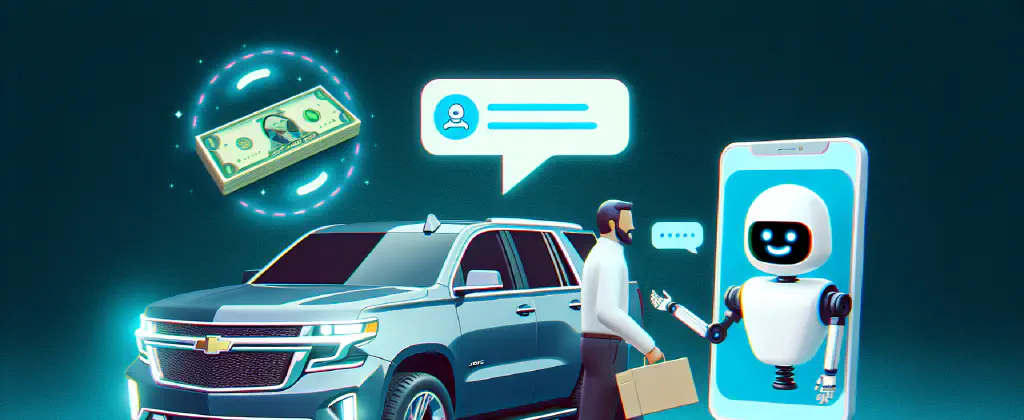18. December 2023
"I just bought a 2024 Chevy Tahoe for $1"

Did you ever imagine buying a brand new car for just $1? Sounds too good to be true, right? Well, it happened to one lucky individual who shared their story online. However, what might initially seem like a stroke of luck, actually reveals some thought-provoking insights about customer service and the rise of chatbots in today’s digital era.
The Rise of Chatbots: Helpful or Cruel Joke?
In recent years, chatbots have become increasingly prevalent as a means of customer service. Many companies have adopted this technology to streamline interactions and provide automated assistance. But not everyone is a fan. User @MichaelRo expressed frustration with chatbots, saying, “I never understand people who engage with chat bots as customer service… Robots are a cruel joke on customers.”
Their sentiment strikes a chord with many who have encountered chatbots that seem ill-equipped to handle customer inquiries or provide real assistance. User @phkahler shared a personal experience of scheduling a tour of an apartment through a chatbot, only to find out later that it was a complete fabrication. This raises the question of whether chatbots are doing more harm than good for businesses.
The Liability of Companies and the Reasonable Test
Commenter @bbarnett brought up an important point about the liability of companies for the promises made by their representatives, whether they are humans or chatbots. They highlighted the concept of “reasonable test” in determining whether a company is bound by the statements made by their chatbots. This raises interesting legal implications, where companies could be held accountable for the actions of their automated representatives.
However, commenter @no_wizard disagreed with the reasonable test and argued that companies should be held liable for the claims made by their employees, including chatbots. They suggested that enforcing this could lead to greater transparency and honesty from businesses and reduce manipulation in the marketplace.
Impersonation, Terms of Service, and Verbal Contracts
The discussion also touched on the issue of impersonation and the terms of service set by chatbot providers. Commenter @Pxtl pointed out that impersonation of an employee or company representative could have legal consequences. They also mentioned the possibility of reporting violations to chatbot providers, such as OpenAI, if they are using their technology.
Furthermore, the mention of verbal contracts brought up an interesting perspective. @wouldbecouldbe argued that if a chatbot is authorized to discuss prices and make sales claims, the statements it makes should be considered binding. They believe that companies should be responsible for the actions of their chatbots.
The Dilemma of Customer Support
The conversation also delved into the broader issue of customer support. While chatbots can be frustrating for many, some individuals have had positive experiences. User @gerl1ng shared a story about a successful interaction with a chatbot from a telecommunications company that helped resolve an internet speed issue. This showcases that there is potential for chatbots to provide effective support when implemented correctly.
However, user @joshmanders expressed their dissatisfaction with the prevalence of chatbots and outsourced support that cannot provide real assistance. They emphasized the importance of having genuine human support to meet customer needs, rather than relying on scripted responses.
The Perfect World vs. the Reality
In a perfect world, customer support would be efficient, transparent, and always available. However, as user @garciasn pointed out, the reality of the legal system and the costly nature of pursuing legal action often deter individuals from seeking justice for false promises or misleading chatbot interactions.
Nonetheless, the conversation highlights the need for businesses to tread carefully when implementing chatbot technology. Without clarity, transparency, and attention to customer needs, chatbots can turn into sources of frustration for customers.
So, while buying a brand new 2024 Chevy Tahoe for just $1 may seem like a dream come true, it also serves as a catalyst for discussing the complexities and implications of automated customer service in the modern world. The future of chatbots and customer support remains uncertain, but one thing is clear - businesses must find the right balance between technology and human interaction to provide the best experience for their customers.
Source: https://twitter.com/ChrisJBakke/status/1736533308849443121